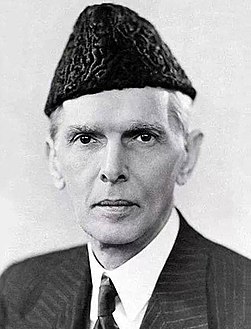history of quaid e azam (MUHAMMAD ALI JINNAH)
Muhammad Ali Jinnah (born Mahomedali Jinnahbhai; 25 December 1876 – 11 September 1948) was a barrister, politician and the founder of Pakistan.[2] Jinnah served as the leader of the All-India Muslim League from 1913 until Pakistan's creation on 14 August 1947, and then as Pakistan's first Governor-General until his death. He is revered in Pakistan as Quaid-i-Azam ("Great Leader") and Baba-i-Qaum, ("Father of the Nation"). His birthday is a national holiday.
Born in Karachi and trained by Lincoln as a barrister, Jinnah emerged as a key leader of the All India Congress in the first two decades of the twentieth century . In the early days of his politics, he worked for Hindu-Muslim unity. He was also instrumental in drafting the Lucknow Pact between the All India Muslim League and the All India Congress in 1916 . Jinnah was one of the key leaders of the All India Home Rule League . He also made fourteen points aimed at protecting the political rights of Muslims in India . However, Jinnah was elected to the All India Congress in 1920Resigned due to the decision of the All India Congress to run the Satyagraha campaign under the leadership of Mohandas Gandhi . By 1940, Jinnah was convinced that the Muslims of India should strive for a separate homeland. That same year, the Muslim League , led by Jinnah, passed the Pakistan Resolution , which called for the establishment of a new state. During World War II , the All India Muslim League gained strength while several Congress leaders were serving time in prison, and elections were held shortly after the end of the war, with Jinnah's party allocating to Muslims. Won a large number of seats. after this
All India Congress and the All India Muslim League United India could not agree on a section of the balance of powers As a result, all parties were in agreement on this matter, India, Pakistan, while the remaining areas in a Muslim-majority areas in which the two parts May India be established.
As the first Governor General of Pakistan , Jinnah worked for the establishment of his government policies as well as for the welfare and resettlement of millions of people who migrated to Pakistan after the partition of India . Personally cared for these refugee camps. Jinnah died at the age of 71 while his newborn country was ruled by the British EmpireIt was only a year since they were liberated. Stanley Wolpert , the author of his autobiography, writes that he (Jinnah) will be the greatest leader of Pakistan .




Comments
Post a Comment